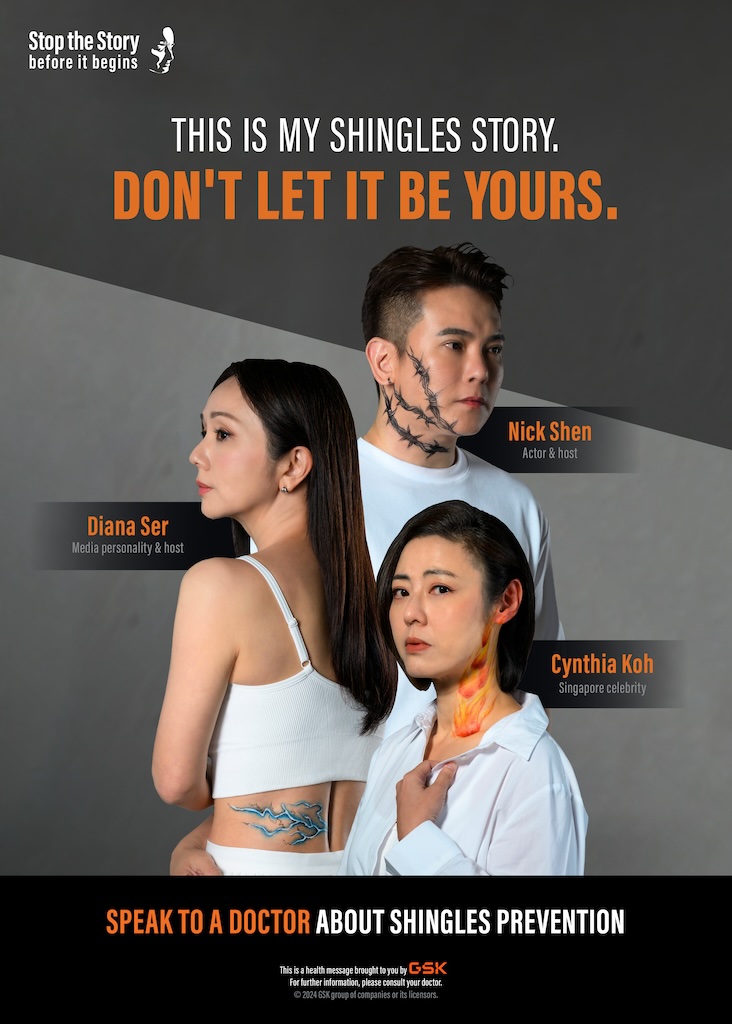Lack of understanding of shingles
GSK Singapore released findings of global survey highlighting the gaps related to shingles.

A campaign by GSK Singapore.
GSK Singapore has released findings from a global survey which highlights some significant gaps in the understanding of the risk of shingles among those aged 50 and over, a group of adults already at risk of the disease.
The research amongst 3,500 adults aged 50 and over from 12 countries, assessed respondents’ understanding of shingles, what triggers it, and its impact on people’s lives. GSK released the survey findings as part of its Shingles Awareness Week happening on February 26 to March 3, 2024. This is a global campaign to raise awareness and address the lack of knowledge about the risks and impact of shingles.
The findings show that a significantly high proportion of those surveyed do not understand their risk of developing shingles, with 86 percent underestimating that risk. A quarter (26 percent) estimated that one in 100 are at risk of shingles in their lifetime, almost a fifth (17 percent) thought it is one in 1,000, and almost half believe (49 percent) they are unlikely to develop shingles.
In reality, most adults already have the virus that causes shingles present in their bodies by the age of 50, which may reactivate with advancing age. Shingles is caused by the reactivation of the varicella-zoster virus (VZV), the same virus that causes chickenpox. As people age, the strength of the immune system response to infection wanes, increasing the risk of developing shingles, and thus putting those aged 50 and over at increased risk.
The survey results also show a lack of awareness of the pain that shingles can cause. The disease, which typically presents as a rash, with painful blisters across the chest, abdomen or face, is often described as aching, burning, stabbing or shock-like. Yet one in 10 adults surveyed don’t know the most common symptoms of shingles, and over a quarter (28 percent) believe shingles is “essentially harmless”.
Following the shingles rash, a person can also experience post-herpetic neuralgia (PHN), a long-lasting nerve pain that can last weeks or months and occasionally persist for several years. PHN is the most common complication of shingles, occurring in five-30 percent of all shingles cases from findings in various studies.
In a separate GSK-sponsored Ipsos-MORI survey, findings revealed only three percent of Singaporeans aged 50 to 79 years believe they are at high risk of developing shingles in the next 12 months. The survey among 200 respondents further reported that while 40 percent believe shingles is serious, only six percent spoke to a healthcare professional about protection against the disease.
As part of Shingles Awareness Week, GSK also partnered with three local personalities – Diana Ser, Cynthia Koh and Nick Shen – to highlight the risks shingles pose to one’s health and the severity of the infectious disease. The personalities have all directly or indirectly suffered from shingles either as a patient or as carers of an infected loved one.
As part of its Shingles Awareness Week campaign, GSK has worked together with these artists to produce a content series, titled “This is My Shingles Story, Don’t Let it be Yours”, documenting their first-hand experience with shingles and their recovery journey. Through this campaign, GSK hopes to underscore the urgency of shingles prevention and encourage discussions with healthcare profession on mitigating shingles infections amongst patients with underlying conditions especially.
** To find out more about shingles, go to: www.stopshingles.com.

0 Comments